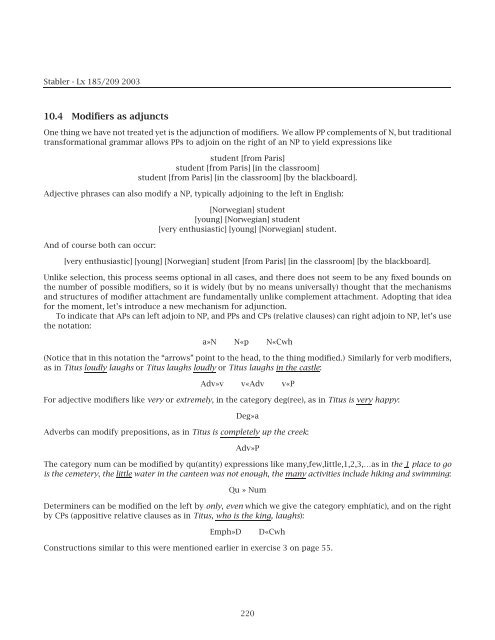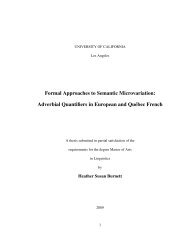Notes on computational linguistics.pdf - UCLA Department of ...
Notes on computational linguistics.pdf - UCLA Department of ...
Notes on computational linguistics.pdf - UCLA Department of ...
Create successful ePaper yourself
Turn your PDF publications into a flip-book with our unique Google optimized e-Paper software.
Stabler - Lx 185/209 2003<br />
10.4 Modifiers as adjuncts<br />
One thing we have not treated yet is the adjuncti<strong>on</strong> <strong>of</strong> modifiers. We allow PP complements <strong>of</strong> N, but traditi<strong>on</strong>al<br />
transformati<strong>on</strong>al grammar allows PPs to adjoin <strong>on</strong> the right <strong>of</strong> an NP to yield expressi<strong>on</strong>s like<br />
student [from Paris]<br />
student [from Paris] [in the classroom]<br />
student [from Paris] [in the classroom] [by the blackboard].<br />
Adjective phrases can also modify a NP, typically adjoining to the left in English:<br />
And <strong>of</strong> course both can occur:<br />
[Norwegian] student<br />
[young] [Norwegian] student<br />
[very enthusiastic] [young] [Norwegian] student.<br />
[very enthusiastic] [young] [Norwegian] student [from Paris] [in the classroom] [by the blackboard].<br />
Unlike selecti<strong>on</strong>, this process seems opti<strong>on</strong>al in all cases, and there does not seem to be any fixed bounds <strong>on</strong><br />
the number <strong>of</strong> possible modifiers, so it is widely (but by no means universally) thought that the mechanisms<br />
and structures <strong>of</strong> modifier attachment are fundamentally unlike complement attachment. Adopting that idea<br />
for the moment, let’s introduce a new mechanism for adjuncti<strong>on</strong>.<br />
To indicate that APs can left adjoin to NP, and PPs and CPs (relative clauses) can right adjoin to NP, let’s use<br />
the notati<strong>on</strong>:<br />
a»N N«p N«Cwh<br />
(Notice that in this notati<strong>on</strong> the “arrows” point to the head, to the thing modified.) Similarly for verb modifiers,<br />
as in Titus loudly laughs or Titus laughs loudly or Titus laughs in the castle:<br />
Adv»v v«Adv v«P<br />
For adjective modifiers like very or extremely, in the category deg(ree), as in Titus is very happy:<br />
Deg»a<br />
Adverbs can modify prepositi<strong>on</strong>s, as in Titus is completely up the creek:<br />
Adv»P<br />
The category num can be modified by qu(antity) expressi<strong>on</strong>s like many,few,little,1,2,3,…as in the 1 place to go<br />
is the cemetery, the little water in the canteen was not enough, the many activities include hiking and swimming:<br />
Qu » Num<br />
Determiners can be modified <strong>on</strong> the left by <strong>on</strong>ly, even which we give the category emph(atic), and <strong>on</strong> the right<br />
by CPs (appositive relative clauses as in Titus, who is the king, laughs):<br />
Emph»D D«Cwh<br />
C<strong>on</strong>structi<strong>on</strong>s similar to this were menti<strong>on</strong>ed earlier in exercise 3 <strong>on</strong> page 55.<br />
220
















